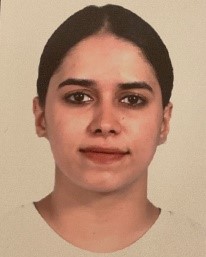Dr. Snigdha Singh
(Assistant Professor)

Dr. Snigdha Singh was born and raised in Delhi, India. She received her B.Sc. degree from Hindu College in 2013 and M.Tech. degree (Chemical Synthesis and Process Technologies) in 2016 from University of Delhi, India. She completed her doctoral studies on medicinal chemistry from University of Delhi in the year 2021 under the supervision of Prof. Ramesh Chandra. During PhD research, Snigdha majorly worked on the synthesis of biologically active small heterocyclic molecules. In 2018, She received Indo-Italy PhD Exchange Scholarship awarded by the MHRD, Govt. of India to carry out research at the University of Siena, Italy for a period of nine months.
Later in 2020, She was one of the few students who were awarded Indo-UK Newton Bhabha Scholarship by the British Council (U.K.) to carry out research at the University of Oxford, U.K. She worked on natural product synthesis to treat Leishmaniasis. She received various young scientist travel awards to attend International Conferences.
In 2021, after her doctoral studies Snigdha worked as a guest scientist at the Humboldt University of Berlin to work on the Synthesis of potential analogs for ACER3 activity. In 2023, She also went to Rensselaer Polytechnic Institute as Postdoctoral Research Associate to work on Design and Synthesis of Neuropathic Inhibitors. To illustrate, she has to her credit one international patent, 2 Books; and more than 29 original Scientific Research Papers in International journals of repute.
In June 2023, Snigdha joined the Department of Chemistry, University of Delhi as an Assistant Professor. Her research interest lies in the areas of development of novel small heterocyclic molecules as potent anticancer, antimalarial and antibacterial agents, their binding interaction with blood proteins and synthesis of metallic nanoparticles for drug delivery in cancer cell lines.
Selected Publications:
- M. Amaral, H. Asiki, C. E. Sear, S. Singh, P. Pieper, M. M. Haugland, E. A. Anderson and A. G. Tempone. (2023) Biological Activity and Structure−Activity Relationship of Dehydrodieugenol B Analogues against Visceral Leishmaniasis. RSC Med. Chem., 14, 1344-50.
- R. Aggarwal, M. Hooda, P. Kumar, S. Kumar, S. Singh, R. Chandra. (2023) An Expeditious On-Water Regioselective Synthesis of Arylidene-hydrazinyl-thiazoles as Novel DNA Targeting Agents. Bioorganic Chemistry, 106524.
- M. Fabrizio, M. Luisa, C. Enrica, P. Sara, E. Cini, S. Singh, P. Governa, S. Maramai, G. Giannini, B. Stecca, E. Petricci. (2022) Quinolines and oxazino-quinoline derivatives as small molecule GLI1 inhibitors identified by virtual screening. ACS Med. Chem. Lett., 13, 1329-1336
- Y. Guptaa, N. Sharmaa, S. Singh, J.G. Romero, V. Rajendran, R. M. Mogire, M. Kashif, J. Beach, W. Jeske, P. Singh, B.R. Ogutu, S.M. Kanzok, H.M. Akala, J. Legac, P. Rosenthal, D.J. Rademacher, R.V. Durvasula, A.P. Singh, B. Rathi, P. Kempaiah. (2022) The multistage antimalarial compound Calxinin pertuberates P. falciparum Ca2+ homeostasis by targeting a unique ion channel. Pharmaceutics, 14, 1371.
- S. Singha, V. Singha, R.S. Hadaa, R. Jaina, M. Vashisthaa, G. Kumaria, , N. Sharmaa, M. Bansal, Poonam, M. Zoltner, C.R. Caffrey, B. Rathi, S. Singh. (2022) Designing and development of phthalimides as potent anti-tubulin hybrid molecules against malaria, Eur. J. Med. Chem., 239, 114534.
- A. Singh, S. Singh, S. Sewariya, N. Singh, M. Singh, R. Bandichhor, R. Chandra. (2021) Microwave-Assisted Stereoselective Synthesis of Pyrazinoindoles using 1,1,1,3,3,3-Hexafluoro-2-propanol (HFIP) as the solvent via Pictet-Spengler Reaction. Tetrahedron, 84 (88),132017.
